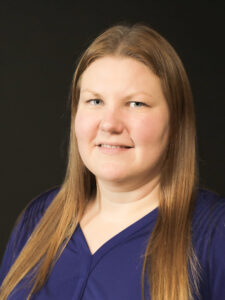Jenelle Lukasik
Program Coordinator, Division of Natural and Behavioral Sciences
Associate Professor

Faculty Profile
Jenelle Lukasik remembers how she got a police officer interested in mathematics. He was taking a statistics course, and she was talking about a Z-score: a measure of how far a data point is from the average. A high Z-score, she explained, indicates that something unusual might be happening.
After the class, the officer told her that he had been assigned to go through crime reports and highlight high Z-scores, without knowing what they meant. Now, he realized that they pointed to high-crime areas. “I just did what I was told, but now I understand,” he told her.
Making math accessible to students is a specialty for Lukasik, associate professor of mathematics at Hilbert College. The college doesn’t offer a math major or degree. Instead, she teaches math classes for students pursuing degrees in other fields.
Her goal is to equip them with mathematical tools they can use in their work and their daily lives. “I like to teach stuff that has practical applications to it,” she said. “That’s where students start to see how cool math can be.”
Drawn to Teaching
Although Lukasik was good at math, growing up in Buffalo it was not her primary interest. She enjoyed reading, as well as dancing, tennis and playing the cello. “I like to do a lot of everything,” she said.
Another favorite pastime was teaching. When she learned something interesting at school, she would come home and try to teach it to her younger sister.
Friends, too, would ask her for math assistance, she recalled. “It was a subject I enjoyed, and I found I could explain it to others.”
When Lukasik went to a local college, her career goal was to teach high school math. She got a dual bachelor’s degree in math and adolescent education.
Going on to a master’s program, she opted for a math degree because it paid her tuition, in return for tutoring and teaching as a graduate assistant. She found, to her surprise, that she enjoyed instructing college students.
A former teacher from her high school who was now teaching at Hilbert encouraged her to apply for a part-time job there. A year later, in 2007, Lukasik went full time.
She’s been there ever since. “What I really wanted to do was help the students,” she said. “Moving over to a school like Hilbert, I could do that. I had small classes, and I could get to know my students.”
Practical Math
While getting her master’s degree, Lukasik was delighted to discover how diverse math could be. One of her favorite courses was knot theory, a branch of topology that studies mathematical surface models and various ways of turning them into knots.
At Hilbert, she says, most of her students won’t have much use for algebra or calculus. But many can use a course called Discrete Mathematics. Its concepts—such as set theory, functions and mathematical logic —are foundational to how computers operate.
“It’s not a programming course, but it teaches students how to deal with logic and set up steps to create a program,” she said. “It teaches them how to work in different number systems, such as binary. It connects to something they’re probably going to be doing, such as cybersecurity or computer science.”
She created another course called Mathematical Applications, in which students devise projects that use math in everyday life. One section deals with math and sports, while another applies math to health and fitness.
For a section on graph theory, students pick five places they visit on a regular basis. They use a variety of methods to analyze routes among those places and compare and contrast the results.
“They may find a more efficient route to do their daily errands,” Lukasik said. “It gives them an opportunity to create something for themselves and to see math in a different way.”
Different Styles for Different Students
Fundamental to Lukasik’s teaching philosophy is the concept of learning styles. “It’s about how you take in information,” she said.
One student may respond well to frequent quizzes, she explained, while another might learn better by doing hands-on projects. One might prefer listening to lectures while another may absorb concepts by doing practice problems.
“I try to make sure that my teaching style hits all those different learning styles,” she said. “There might be part of the lesson in which I am lecturing, but then there’s going to be part of the lesson where they’re working on practice problems, and there are going to be times when they’re getting assessed on a project.”
As she walks around a room, she observes how students are approaching their classwork. If one appears stuck, she’ll offer an explanation. “I can tell by their faces whether they’re getting it,” she said. “If they’re not getting it, I need to pivot and try to re-explain something in a new way. I find I’m continually learning new ways to explain things.”
After 16 years of teaching at Hilbert, Lukasik can’t think of a job she’d rather be doing. “A lot of people start teaching so they can get into administration,” she said. “I like being in the classroom. I like working with the students. I like moments when a student says to me, ‘That made sense when you explained it, and that’s never made sense to me before.”
Explore the Benefits of a Holistic Education
In today’s complex business world, employers value workers with a well-rounded education as well as expertise in a specific field. A student-centered and liberal arts-oriented institution like Hilbert College— and dedicated educators like Jenelle Lukasik—can prepare a student with general problem-solving and critical thinking skills, along with depth in areas like business management, cybersecurity, criminal justice, and forensic science. Discover how this holistic approach can prepare you for a rewarding career in a wide variety of occupations.

